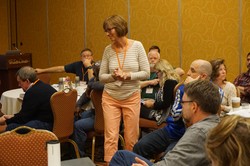Eileen Murphy, founder and president of Extraordinary Leadership Coaching in Washington, D.C., still remembers the time she took a chance and challenged a new vice president in the business world to literally take a step of commitment.
The vice president, whom Murphy was coaching, had just been promoted but was struggling to see himself in this new role. When he looked in the mirror, he wasn’t sure he was VP material. He was getting in his own way, sabotaging this new promotion.
As she listened to the man describe his struggle, Murphy noticed his business jacket hanging on his door. Asking him to put it on, she began putting a strip of masking tape on the floor. Then she stood up and said, “So what is your commitment? If you’re going to do this, would you step over the line?” The man paused, then stepped over. “It was so significant for him,” Murphy said. “In that moment, he was stepping into that role fully.”
Murphy now uses that step of commitment as a regular part of what she calls her “conscious based coaching.” She shared that approach here with more than 50 New Worshiping Community coaches, as part of their training to coach future leaders in the Presbyterian Church (U.S.A.)’s 1001 New Worshiping Communities movement.
“For a person making a really big choice, this is an important step,” Murphy said. “I’ve seen it really help people get unstuck.”
Years after her session with the new vice president, Murphy interviewed him for a project she was working on. According to Murphy, the man said the “take a step” exercise had been quite meaningful for him. “I want you know,” he said, “that masking tape is still in my office.”
“I’ve never forgotten what I learned from that,” Murphy said, “how important it is to use your physical body in the coaching work.”
In her conscious based coaching, Murphy first helps her clients clarify their topic of concern, so that they can develop perspective. “People really need to understand where are,” she said, “and then recognize how they feel. Usually it is their anxiety or fear that causes them to be stuck.”
Murphy also asks her clients to verbalize their situation by giving it a one-word name. If someone says “exhausting,” she labels it the opposite—“exhilarating.” As they explore together what the person would like their situation to be like, she begins to process possible choices with them. That exploration, in turn, leads to planning, commitment, and action.
“Not all clients are like the VP I told you about,” Murphy said. “Sometimes people aren’t ready to fully say, ‘I’m in.’” In those situations, she’ll sometimes ask them, “Would you try it for a month then?” If they say yes, she has them write it down.
Murphy says coaching is an “organic thing.” Sometimes as she’s thinking, “There’s no way,” she’ll get an intuition, which often proves fruitful for her clients.
“Use your access to the Holy Spirit,” she told the “1001” coaches. “Sometimes you can help your leaders make a choice right now, and they can try it out, to see if it is where God is leading them.”
---
The 1001 New Worshiping Communities training event was held in conjunction with the Disciple Making Conference.

